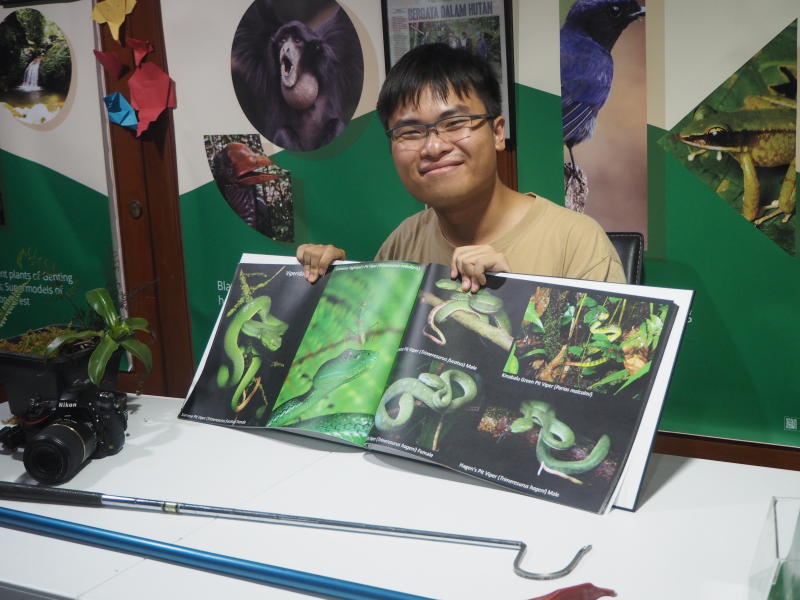#TeamHansel: Walking on the wild side
#TeamHansel took a walk on the wild side when they went herping, and it was such an experience they wrote a story about it too! rage.com.my/wong-of-the-wild/
Hey, don’t miss out on our #BRATsventures – apply for our December camp! Registration is now open, at rage.com.my/bratsrecruitment
Posted by BRATs on Thursday, 28 September 2017
By TEAM HANSEL

Wong showcasing the photographs he has taken of herpetofauna.
AVID nature guide and photographer Steven Wong has more than just a few snakebites from his world travels. However, these unfortunate events have done nothing to deter his undying passion for exploring the biodiversity of amphibians and reptiles.
Wong is a Kuala Lumpur-born naturalist and active volunteer at the Malaysian Nature Society (MNS) Selangor branch.
He is working towards raising awareness about the importance of biodiversity by hosting nature walks and talks under the MNS Herpetofauna Special Interest Group.
Herpetofauna refers to the reptiles and amphibians found in a particular area. The 27-year-old has travelled into the hearts of countless jungles, capturing precious moments and compiling them into a personal album.
Photographs and memories are the closest he can get to the animals since he believes they are best left out in the wild.
Ever since he was a child, Wong was fascinated by reptiles and amphibians after watching The Crocodile Hunter. He claimed to be “jealous” of the Amazon rainforest when he was young.
“I heard a lot about the Amazon and all the cool animals they have over there.”
However, he eventually came to realise that the rich biodiversity in Malaysia is just as remarkable.
“We’ve got some really interesting lizards and snakes in Malaysia,” said Wong.
Wong joined MNS as a member during his university years. However, it was his friend, Lim Teck Wyn, who ignited a spark in him that led him to fully immerse himself into capturing photographs of herpetofauna.
When asked about his most interesting shot thus far, Wong recalls his experience with the Kinabalu Pit Viper. However, he didn’t get the perfect shot and hopes to see the species again in the near future.
“As you grow as a photographer, you tend to get pickier with your shots,” Wong said.
Our team from the BRATs camp was lucky enough to see the amphibians and reptiles up close when Wong took us night herping.
Night herping refers to the search of amphibians and reptiles at night. According to Wong, herping should be done at night since it is easier to spot the nocturnal animals by their eyeshine and the humidity levels at night encourage the herpetofauna living underground to surface.
Out of all the different kinds of species we spotted, the highlight was the sighting of the male Siamese Pit Viper.
The venomous snake had a line of thin red scales dividing its fluorescent green body in near-perfect symmetry. Wong, the adrenaline seeker as he is, enjoys the risk of snapping shots from various angles when a venomous snake is within range.
“The more dangerous the snake is, the more exciting the shots are. I tend to gravitate towards those. They’re more eyecatching and photogenic,” he said.
The misconception Wong aims to debunk is that snakes are dangerous animals that can strike on instinct.
“A lot of our snakes here in Malaysia are not venomous,” Wong said.
He advised against killing them on instinct, but rather calming down and taking time to appreciate them.
Likewise, to correct the delusion of amphibians being dangerous and harmful, he recommended taking photographs to admire their beauty instead of backing away.
“Some people think frogs are icky, but give them a second chance. When you go camping next time, or if you picnic next to a river, try to look for them, take pictures and appreciate them.”
Over the years, increased industrial development at an unhealthy rate has distorted the natural conditions of the jungle, making it harder for animals to survive and preserve their species.
Animals are going extinct at a faster rate than ever before and this has a major negative impact on our ecosystem. As a strong supporter of animal welfare, Wong advocates the protection of the natural environment.
“It is my way of giving back to nature,” said Wong. After all, it is our biodiversity that makes our country as special as it is.


Tell us what you think!